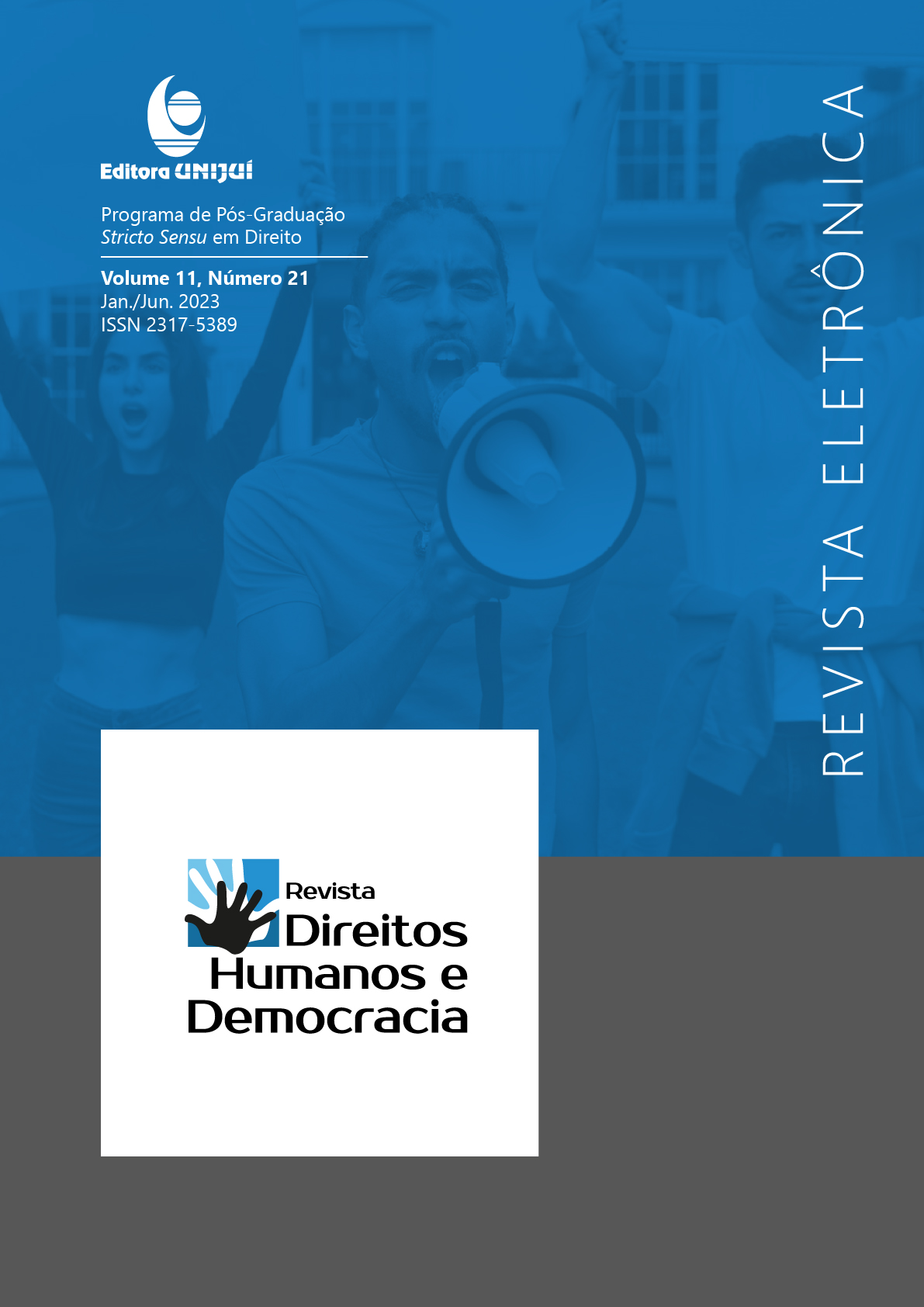Bases conceituais do pensamento sistêmico e do direito sistêmico a partir da obra de Sami Storch
DOI:
https://doi.org/10.21527/2317-5389.2023.21.13702Palavras-chave:
Paradigma. Pensamento Cartesiano. Pensamento Sistêmico. Ciência tradicional. Direito Sistêmico.Resumo
Ao afirmar que “o todo é maior que a soma de suas partes”, Aristóteles expôs, de forma simplificada e direta, o fundamento utilizado atualmente pelos defensores do pensamento sistêmico, que, reconhecendo a complexidade das sociedades e, consequentemente, dos conflitos e experiências sociais, se propõem a defender o surgimento de um novo paradigma científico. O surgimento desse novo modo de pensar surge em resposta ao reconhecimento de que o Direito, enquanto ciência, não tem sido capaz de criar soluções eficazes ao tratamento e solução de vários conflitos por meio da aplicação do método científico tradicional que entende o fenômeno como sendo simples, objetivo e estável. Tal postulação despertou na comunidade acadêmica a necessidade de debater acerca desse novo método de pensar, que, compreendendo o conflito de forma complexa, se propõe a solucionar os litígios a fim de se alcançar o equilíbrio e a paz ao sistema, hoje considerado complexo. É partindo da premissa de que não é possível se ter uma visão clara sem se conhecer o todo e sem levar em conta as suas diversas interações, que firmamos o nosso entendimento no sentido de que a revolução ao método científico cartesiano se mostra como necessária, pois a ciência não comporta mais uma compreensão fundada em padrões ou parâmetros de certo ou errado, verdadeiro ou falso, posto que tais posturas repercutem diretamente na perda de espaço diante das diversas possibilidades advindas da complexidade dos sistemas.
Referências
AGUIAR, Ana Cecília Bezerra de et al. Direito sistêmico: o despertar para uma nova consciência jurídica. Rio de Janeiro: Lumen Juris, 2018.
BRASIL. Constituição 1988. 1988. Disponível em: http://www.planalto.gov.br/ccivil_03/constituicao/constituicao.htm. Acesso em: 10 jun. 2021.
BRASIL. Lei nº 13.105, de 16 de março de 2015. Código de Processo Civil. Disponível em: http://www.planalto.gov.br/ccivil_03/_ato2015-2018/2015/lei/l13105.htm. Acesso em: 26 maio 2021.
BRASIL. Resolução nº 125, de 29 de novembro de 2010. Política Judiciária Nacional de tratamento adequado dos conflitos de interesses no âmbito do Poder Judiciário, e dá outras providências.
CAPRA, Fritjof. A revolução ecojurídica: o direito sistêmico em sintonia com a natureza e a comunidade. São Paulo: Cultrix, 2018.
DESCARTES, René. Discurso do método. Tradução Ciro Mioranza. São Paulo: Lafonte, 2017.
DESCARTES, René. Discurso do método. Tradução Maria Ermantina Galvão. São Paulo: Fontes, 1996.
KUHN, Thomas S. A estrutura das revoluções científicas. 5. ed. São Paulo: Perspectiva, 1998.
LINCOLN, Yvonna Sessions; GUBA, Egon G. Paradigmatic controversies, contradictions and emerging confluences. In Norman Kent Denzin & Yvonna Sessions Lincoln (Eds.), Handbook of Qualitative Research (2nd. Editi., pp. 163-188). Thousand Oaks, CA: Sage Publications, Inc. 2000.
MPPR. Círculos restaurativos auxiliam na solução de disputas familiares. 2018. Disponível em: https://mppr.mp.br/2018/01/19907,10/Circulos-restaurativos-auxiliam-na-solucao-de-disputas-familiares.html. Acesso em: 17 jun. 2021.
PORTUGAL. Carta da transdisciplinaridade. 1994. Disponível em: http://www.gthidro.ufsc.br/arquivos/CARTA-DA-TRANSDISCIPLINARIDADE.pdf. Acesso em: 15 jun. 2021.
REALE, Miguel. Lições preliminares de Direito. 27. ed. São Paulo: Saraiva, 2002.
SANTOS, Boaventura de Sousa. A crítica da razão indolente: contra o desperdício da experiência. São Paulo: Cortez, 2007.
STORCH, Sami. A origem do direito sistêmico: pioneiro do movimento de transformação da Justiça com as Constelações Familiares. Brasília, DF: Tagore, 2020.
STORCH, Sami. Direito sistêmico: a resolução de conflitos por meio da abordagem sistêmica fenomenológica das constelações familiares. 2014. Disponível em: https://direitosistemico.wordpress.com/2017/09/22/artigo-descreve-modelo-original-de-pratica-de-constelacoes-na-justica-e-aplicabilidade-do-direito-sistemico/. Acesso em: 10 dez. 2020.
STORCH, Sami; DE ANDRADE, Roberta Rotta Messias; DA ROSA, Amilton Plácido; DA CUNHA, Karla. (Org.). Estudos de Direito Sistêmico – Volume 1. Brasília: Tagore Editora, 2022.
VASCONCELLOS, Maria José Esteves de. Pensamento sistêmico: o novo paradigma da ciência. 11. ed. Campinas, SP: Papirus, 2018.
Downloads
Publicado
Como Citar
Edição
Seção
Licença
Copyright (c) 2023 Revista Direitos Humanos e Democracia

Este trabalho está licenciado sob uma licença Creative Commons Attribution 4.0 International License.
Ao publicar na Revista Direitos Humanos e Democracia, os autores concordam com os seguintes termos:
Os trabalhos seguem a licença Creative Commons Atribuição 4.0 Internacional (CC BY 4.0), que permite:
Compartilhar — copiar e redistribuir o material em qualquer meio ou formato;
Adaptar — remixar, transformar e criar a partir do material para qualquer fim, inclusive comercial.
Essas permissões são irrevogáveis, desde que respeitados os seguintes termos:
Atribuição — os autores devem ser devidamente creditados, com link para a licença e indicação de eventuais alterações realizadas.
Sem restrições adicionais — não podem ser aplicadas condições legais ou tecnológicas que restrinjam o uso permitido pela licença.
Avisos:
A licença não se aplica a elementos em domínio público ou cobertos por exceções legais.
A licença não garante todos os direitos necessários para usos específicos (ex.: direitos de imagem, privacidade ou morais).
A revista não se responsabiliza pelas opiniões expressas nos artigos, que são de exclusiva responsabilidade dos autores. O Editor, com o apoio do Comitê Editorial, reserva-se o direito de sugerir ou solicitar modificações quando necessário.
Somente serão aceitos artigos científicos originais, com resultados de pesquisas de interesse que não tenham sido publicados nem submetidos simultaneamente a outro periódico com o mesmo objetivo.
A menção a marcas comerciais ou produtos específicos destina-se apenas à identificação, sem qualquer vínculo promocional por parte dos autores ou da revista.
Contrato de Licença: Os autores mantém os direitos autorais sobre seu artigo, e concedem a Revista Direitos Humanos e Democracia o direito de primeira publicação.













